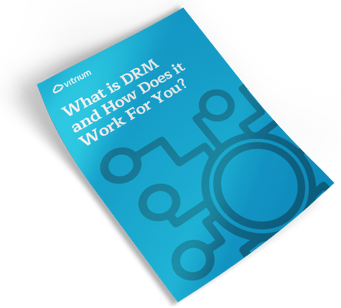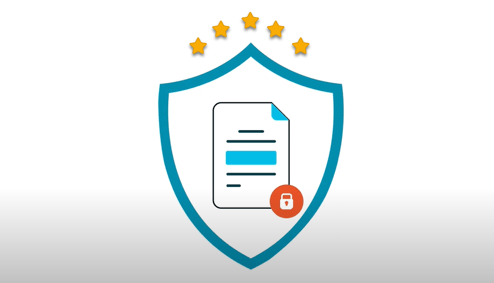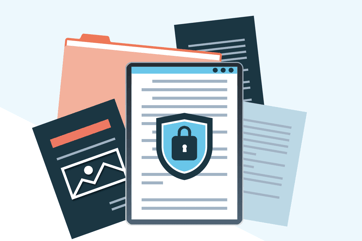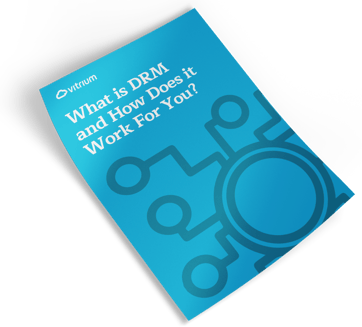Ebook DRM is the set of digital rights management settings and permissions that prevent your ebooks from being illegally copied or shared.
Safeguarding Your eBooks: eBook Security & Digital Rights Management
With the rise of the digital era, eBooks have become increasingly popular, providing both content providers and users with convenient ways to distribute and access digital content. However, as eBooks continue to gain popularity as a primary method of delivering and consuming online content, concerns regarding their security and protection against unauthorized use or distribution have also grown.
This article provides a detailed exploration of eBook security, highlighting the critical role of digital rights management (DRM) solutions in safeguarding intellectual property. Continue reading to learn how DRM can effectively protect your eBooks and deliver a secure and seamless experience for your users.
What is eBook Security?
eBook security encompasses the various measures implemented to safeguard eBooks from unauthorized access, distribution, and piracy. It plays a vital role in protecting the intellectual property rights of authors and publishers, while simultaneously ensuring that genuine users can securely access and enjoy the content.
The Role of Digital Rights Management (DRM):
Digital Rights Management (DRM) is a software solution utilized to enforce copyright protection and control the usage of digital content. In the context of eBooks, DRM plays a crucial role in preventing unauthorized copying, printing, and sharing, thereby upholding the rights of content creators. It relies on encryption algorithms, access controls and restrictions, as well as licensing mechanisms to effectively regulate the distribution and use of eBooks.
Understanding DRM for eBook Security:
DRM software adds multiple layers of protection to eBooks, keeping them secured and exclusive to authorized users. A quality DRM solution will include the following:
- Encryption: DRM technology encrypts eBook files, making them unreadable without proper decryption keys. This prevents unauthorized access and ensures that only authorized users can decrypt and read the content.
- Access Controls: DRM enables content providers to control who can access their eBooks. By implementing access controls such as username and password requirements, publishers can restrict access to authorized users only.
- Usage Limitations: DRM allows publishers to define usage restrictions, such as limiting the number of devices on which an eBook can be accessed, the number of times it can be viewed, the amount of time content is available for, whether or not it can be downloaded or printed. This gives the content provider complete control over their eBooks, and allows them to determine how their content will be accessed and consumed. Having control of digital content helps keep it secure.
- Watermarking and Tracking: A quality, high security DRM system will include watermarking capabilities to embed unique identifiers into eBooks. These user-identifying watermarks deter users from incurring in copyright infringement. If unauthorized copies of the content are found, the watermark can trace them back to the original purchaser, discouraging piracy.
Benefits of DRM for eBook Security:
Implementing DRM for eBook security offers several key advantages:
- Protection against Piracy: DRM significantly reduces the risk of unauthorized copying and distribution, discouraging piracy and safeguarding the revenue of digital content creators & distributors.
- Secure Distribution Channels: DRM enables secure distribution through authorized channels, ensuring that only legitimate users can access the content.
- Flexible Usage Control: DRM allows providers to define usage rules, including the ability to lend eBooks or provide temporary access, striking a balance between convenience for readers and content protection. Additionally, a quality DRM software will allow content providers to provide an excellent user experience to their audience.
- Increased Revenue Potential: By protecting eBooks from piracy, DRM helps maximize revenue potential for authors and publishers, allowing them to produce more quality content.
Balancing eBook Security and End User Experience:
While eBook security is crucial, it is equally important to maintain a positive user experience. Striking the right balance ensures that readers can access and enjoy their eBooks seamlessly while protecting the rights of content creators. Publishers should consider user-friendly DRM solutions, like Vitrium, that provide adequate security without overly restricting legitimate users.
Vitrium offers numerous features that make the end-user experience pleasant. From single sign-on capabilities, to a modern web viewer with multiple annotation tools and collaboration features, Vitrium customers can make sure they’re offering the very best experience to their audience.
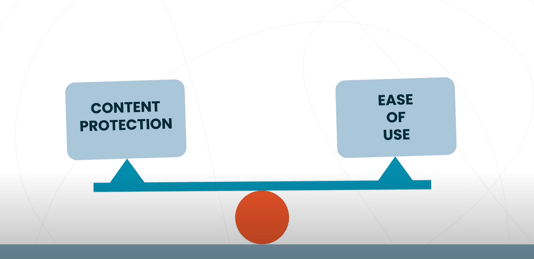
Conclusion:
As eBooks continue to gain popularity, it is essential to prioritize eBook security and the implementation of DRM in order to protect the rights of authors and publishers. By leveraging DRM technology, content creators can effectively safeguard their intellectual property, deter piracy, and maintain control over the distribution and usage of their eBooks. Embracing DRM not only ensures a secure reading experience but also contributes to the long-term sustainability of the eBook industry.
Remember, prioritizing eBook security through DRM is an investment in protecting intellectual property, fostering innovation, and supporting the future of digital publishing.
Vitrium and eBook Security:
Vitrium software thoroughly protects your eBooks, ensuring your IP is not copied, downloaded, or shared with unauthorized users. You remain in complete control:
- Protect your eBooks & convert them to a secure web format & a downloadable protected PDF
- Prevent printing, downloading, copying or sharing
- Apply and customize user identifying watermarks
- Set expiry dates, device limits, open limits & control access by IP address or location
- Provide your users with online and offline access
- Access content in a browser, a user portal, or your website
- Integrate with 3rd party systems
- Provide single sign-on (SSO) access
- Identify who is accessing your PDFs, when, where, & how
Ebook security is crucial for the well-being of your organization. To guarantee content is kept private and protected, to prevent tampering with your intellectual property, and, ultimately, to secure your revenue streams and bottom line.
If you'd like to learn more about protecting PDFs and other types of digital content with Vitrium, please don't hesitate to get in touch with us, we'll be happy to answer any questions you have.
